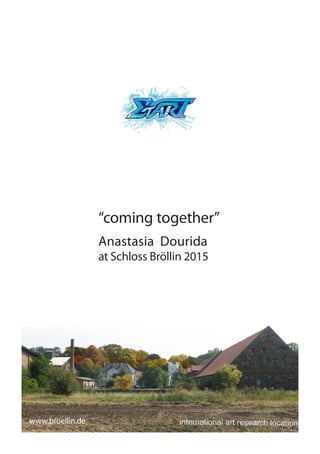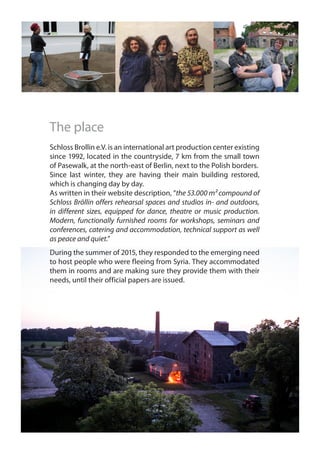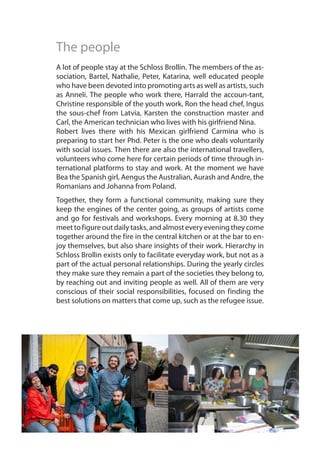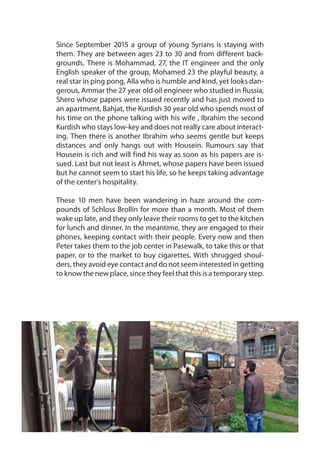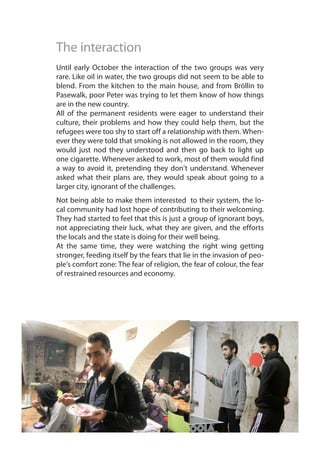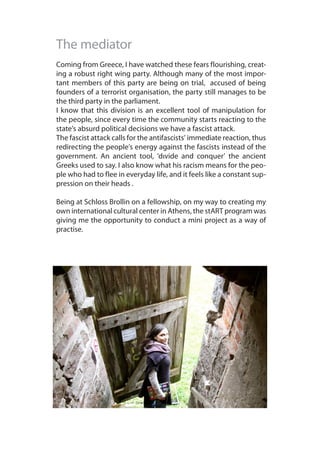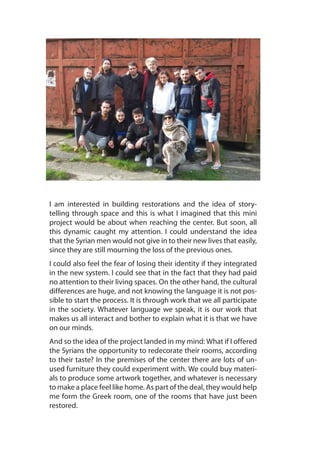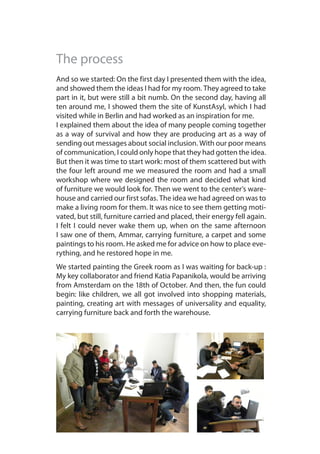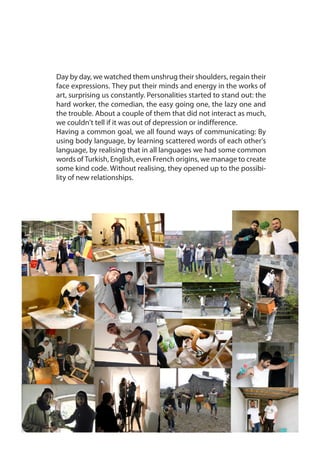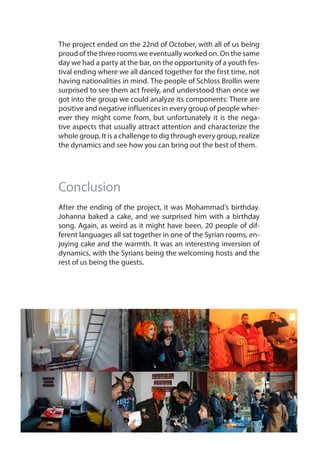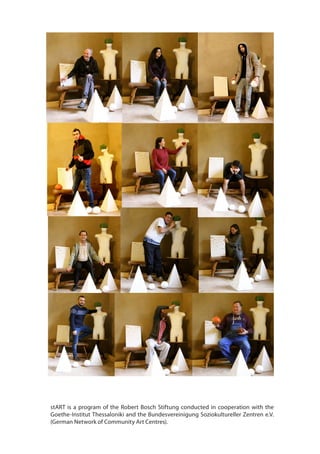coming_together_project
- 1. âcoming togetherâ Anastasia Dourida at Schloss BrÃķllin 2015 www.broellin.de
- 2. The place Schloss Brollin e.V. is an international art production center existing since 1992, located in the countryside, 7 km from the small town of Pasewalk, at the north-east of Berlin, next to the Polish borders. Since last winter, they are having their main building restored, which is changing day by day. As written in their website description, âthe 53.000 mÂē compound of Schloss BrÃķllin offers rehearsal spaces and studios in- and outdoors, in different sizes, equipped for dance, theatre or music production. Modern, functionally furnished rooms for workshops, seminars and conferences, catering and accommodation, technical support as well as peace and quiet.â During the summer of 2015, they responded to the emerging need to host people who were fleeing from Syria. They accommodated them in rooms and are making sure they provide them with their needs, until their official papers are issued.
- 3. The people A lot of people stay at the Schloss Brollin. The members of the as- sociation, Bartel, Nathalie, Peter, Katarina, well educated people who have been devoted into promoting arts as well as artists, such as Anneli. The people who work there, Harrald the accoun-tant, Christine responsible of the youth work, Ron the head chef, Ingus the sous-chef from Latvia, Karsten the construction master and Carl, the American technician who lives with his girlfriend Nina. Robert lives there with his Mexican girlfriend Carmina who is preparing to start her Phd. Peter is the one who deals voluntarily with social issues. Then there are also the international travellers, volunteers who come here for certain periods of time through in- ternational platforms to stay and work. At the moment we have Bea the Spanish girl, Aengus the Australian, Aurash and Andre, the Romanians and Johanna from Poland. Together, they form a functional community, making sure they keep the engines of the center going, as groups of artists come and go for festivals and workshops. Every morning at 8.30 they meet to figure out daily tasks, and almost every evening they come together around the fire in the central kitchen or at the bar to en- joy themselves, but also share insights of their work. Hierarchy in Schloss Brollin exists only to facilitate everyday work, but not as a part of the actual personal relationships. During the yearly circles they make sure they remain a part of the societies they belong to, by reaching out and inviting people as well. All of them are very conscious of their social responsibilities, focused on finding the best solutions on matters that come up, such as the refugee issue.
- 4. Since September 2015 a group of young Syrians is staying with them. They are between ages 23 to 30 and from different back- grounds. There is Mohammad, 27, the IT engineer and the only English speaker of the group, Mohamed 23 the playful beauty, a real star in ping pong, Alla who is humble and kind, yet looks dan- gerous, Ammar the 27 year old oil engineer who studied in Russia, Shero whose papers were issued recently and has just moved to an apartment, Bahjat, the Kurdish 30 year old who spends most of his time on the phone talking with his wife , Ibrahim the second Kurdish who stays low-key and does not really care about interact- ing. Then there is another Ibrahim who seems gentle but keeps distances and only hangs out with Housein. Rumours say that Housein is rich and will find his way as soon as his papers are is- sued. Last but not least is Ahmet, whose papers have been issued but he cannot seem to start his life, so he keeps taking advantage of the centerâs hospitality. These 10 men have been wandering in haze around the com- pounds of Schloss Brollin for more than a month. Most of them wake up late, and they only leave their rooms to get to the kitchen for lunch and dinner. In the meantime, they are engaged to their phones, keeping contact with their people. Every now and then Peter takes them to the job center in Pasewalk, to take this or that paper, or to the market to buy cigarettes. With shrugged shoul- ders, they avoid eye contact and do not seem interested in getting to know the new place, since they feel that this is a temporary step.
- 5. The interaction Until early October the interaction of the two groups was very rare. Like oil in water, the two groups did not seem to be able to blend. From the kitchen to the main house, and from BrÃķllin to Pasewalk, poor Peter was trying to let them know of how things are in the new country. All of the permanent residents were eager to understand their culture, their problems and how they could help them, but the refugees were too shy to start off a relationship with them. When- ever they were told that smoking is not allowed in the room, they would just nod they understood and then go back to light up one cigarette. Whenever asked to work, most of them would find a way to avoid it, pretending they donât understand. Whenever asked what their plans are, they would speak about going to a larger city, ignorant of the challenges. Not being able to make them interested to their system, the lo- cal community had lost hope of contributing to their welcoming. They had started to feel that this is just a group of ignorant boys, not appreciating their luck, what they are given, and the efforts the locals and the state is doing for their well being. At the same time, they were watching the right wing getting stronger, feeding itself by the fears that lie in the invasion of peo- pleâs comfort zone: The fear of religion, the fear of colour, the fear of restrained resources and economy.
- 6. The mediator Coming from Greece, I have watched these fears flourishing, creat- ing a robust right wing party. Although many of the most impor- tant members of this party are being on trial, accused of being founders of a terrorist organisation, the party still manages to be the third party in the parliament. I know that this division is an excellent tool of manipulation for the people, since every time the community starts reacting to the stateâs absurd political decisions we have a fascist attack. The fascist attack calls for the antifascistsâ immediate reaction, thus redirecting the peopleâs energy against the fascists instead of the government. An ancient tool, âdÎđvide and conquerâ the ancient Greeks used to say. I also know what his racism means for the peo- ple who had to flee in everyday life, and it feels like a constant sup- pression on their heads . Being at Schloss Brollin on a fellowship, on my way to creating my own international cultural center in Athens, the stART program was giving me the opportunity to conduct a mini project as a way of practise.
- 7. I am interested in building restorations and the idea of story- telling through space and this is what I imagined that this mini project would be about when reaching the center. But soon, all this dynamic caught my attention. I could understand the idea that the Syrian men would not give in to their new lives that easily, since they are still mourning the loss of the previous ones. I could also feel the fear of losing their identity if they integrated in the new system. I could see that in the fact that they had paid no attention to their living spaces. On the other hand, the cultural differences are huge, and not knowing the language it is not pos- sible to start the process. It is through work that we all participate in the society. Whatever language we speak, it is our work that makes us all interact and bother to explain what it is that we have on our minds. And so the idea of the project landed in my mind: What if I offered the Syrians the opportunity to redecorate their rooms, according to their taste? In the premises of the center there are lots of un- used furniture they could experiment with. We could buy materi- als to produce some artwork together, and whatever is necessary to make a place feel like home. As part of the deal, they would help me form the Greek room, one of the rooms that have just been restored.
- 8. The process And so we started: On the first day I presented them with the idea, and showed them the ideas I had for my room. They agreed to take part in it, but were still a bit numb. On the second day, having all ten around me, I showed them the site of KunstAsyl, which I had visited while in Berlin and had worked as an inspiration for me. I explained them about the idea of many people coming together as a way of survival and how they are producing art as a way of sending out messages about social inclusion. With our poor means of communication, I could only hope that they had gotten the idea. But then it was time to start work: most of them scattered but with the four left around me we measured the room and had a small workshop where we designed the room and decided what kind of furniture we would look for. Then we went to the centerâs ware- house and carried our first sofas. The idea we had agreed on was to make a living room for them. It was nice to see them getting moti- vated, but still, furniture carried and placed, their energy fell again. I felt I could never wake them up, when on the same afternoon I saw one of them, Ammar, carrying furniture, a carpet and some paintings to his room. He asked me for advice on how to place eve- rything, and he restored hope in me. We started painting the Greek room as I was waiting for back-up : My key collaborator and friend Katia Papanikola, would be arriving from Amsterdam on the 18th of October. And then, the fun could begin: like children, we all got involved into shopping materials, painting, creating art with messages of universality and equality, carrying furniture back and forth the warehouse.
- 9. Day by day, we watched them unshrug their shoulders, regain their face expressions. They put their minds and energy in the works of art, surprising us constantly. Personalities started to stand out: the hard worker, the comedian, the easy going one, the lazy one and the trouble. About a couple of them that did not interact as much, we couldnât tell if it was out of depression or indifference. Having a common goal, we all found ways of communicating: By using body language, by learning scattered words of each otherâs language, by realising that in all languages we had some common words of Turkish, English, even French origins, we manage to create some kind code. Without realising, they opened up to the possibi- lity of new relationships.
- 10. The project ended on the 22nd of October, with all of us being proud of the three rooms we eventually worked on. On the same day we had a party at the bar, on the opportunity of a youth fes- tival ending where we all danced together for the first time, not having nationalities in mind. The people of Schloss Brollin were surprised to see them act freely, and understood than once we got into the group we could analyze its components: There are positive and negative influences in every group of people wher- ever they might come from, but unfortunately it is the nega- tive aspects that usually attract attention and characterize the whole group. It is a challenge to dig through every group, realize the dynamics and see how you can bring out the best of them. Conclusion After the ending of the project, it was Mohammadâs birthday. Johanna baked a cake, and we surprised him with a birthday song. Again, as weird as it might have been, 20 people of dif- ferent languages all sat together in one of the Syrian rooms, en- joying cake and the warmth. It was an interesting inversion of dynamics, with the Syrians being the welcoming hosts and the rest of us being the guests.
- 11. On the 27th of October, Barbara Caveng, the artist behind the Kunstasyl visited us, along with some people from their HEIM. We guided them to the rooms, where we proudly explained the process. We had also prepared a story that will be hosted in the KunstAsylâs website, along with some pictures of ours. Having the experience of a similar -although much larger scale - project, they suggested that accomplishing inclusion in the countryside is a challenging task: the city offers much more opportunities, resources and stimuli to integrate. Again, we all sat together discussing about the challenges of the upcoming winter, the stories of the people who fled, what needs to be done. It was a meeting meant to create bridges, promoting the process of coming together as a new unity, instead of accepting the fact that we are two separate groups. What is next? The process of bringing these groups closer, made me think a lot about the language we speak. It is the language that actually creates the difficulty in communication, but once we were ready to communicate, it was the languages again that brought us to- gether, once we started realising that they work like the hoops of a chain. My warmest reward was to see them getting taught their first German by Peter later that night, giving me the feeling that if this project was of some value, this is because it made all of us feel secure enough to open up to communication. But then again there is the problem of definitions, even be- tween people who speak the same language. Not all of us mean the same when referring to the refugees. The same phenom- enon exists with many other words, in most of the languages, as words are only the sounds we once chose to describe situa- tions, meanings, objects and feelings. It is as the words start to take distance from their real meaning that communication gaps grow and communities have to put effort in redefining their identities. Coming from a country experiencing a peak in its identity crisis, could I maybe help people redefine themselves in the same way ?
- 12. stART is a program of the Robert Bosch Stiftung conducted in cooperation with the Goethe-Institut Thessaloniki and the Bundesvereinigung Soziokultureller Zentren e.V. (German Network of Community Art Centres).

